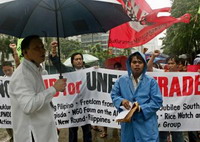Brazil criticizes US and EU's joint business plan
U.S. and EU were criticized by Brazil for disguising a "biased and protectionist" agenda by the mantra of environmentalism.

The Latin American country also said a new compromise proposal on commercial rules at the World Trade Organization was a major setback for liberalization efforts, because of concessions it makes to the United States.
The stark assessment delivered by Roberto Azevedo, the Brazilian Foreign Ministry's trade chief, augurs poorly for the chances of a new global commerce pact, which the 151 WTO members are struggling to advance six years into the negotiations.
The U.S. and the 27-nation EU offered last week to make green goods and services exempt from trade tariffs to boost the use of climate-friendly technology such as solar panels and wind turbines around the world. Their list of 43 products left out ethanol and other so-called biofuels, and all other goods produced primarily in Brazil and other developing countries.
WTO negotiations should "involve positive outcomes for trade, for the environment and for development," Azevedo said. The U.S.-EU proposal "fails to deliver on all three tests. On trade, it is biased. On environment, it has virtually no impact. The world 'development' is not mentioned in the proposal."
Brazil has been touting its sugarcane-based ethanol around the world as a cheap, eco-friendly alternative to fossil fuels amid soaring oil prices and global warming concerns. While its business is booming, Brazil says exports have been held back by high U.S. and European tariffs.
Azevedo said the U.S. and Europe were merely attempting to advance their own interests, and criticized them for claiming that their list of green goods came from the World Bank when they themselves compiled it. He said Brazilian Foreign Minister Celso Amorim would travel to the U.N. climate change conference in Bali, Indonesia, and respond to any false information provided by Washington or Brussels.
"It is not an independent list," he said, adding that the U.S. and EU even considered including sailboats and DVDs among their green exports. "The exclusion of biofuels is particularly striking. It raises serious concerns about the true intentions of the proponents in relation to the environment."
Brazil, which would reap billions of dollars in revenue from widespread ethanol liberalization, has sought to include its fuel among the environmental goods whose tariffs would be significantly reduced or eliminated as part of a global trade deal, but has been consistently blocked by the U.S. and Europe.
Washington and Brussels say the special environmental tariff rules were reserved solely for industrial goods, and not agricultural products.
Petroleum products, like gasoline, face no tariffs. Critics say U.S. and EU ethanol import barriers are in place to protect American and European farmers who cannot produce the fuel as cheaply as in Latin America's largest nation.
Cheaper import taxes on environmental goods would only come into force as part of an overall agreement in the Doha round of trade liberalization talks, which have repeatedly stalled since their inception in Qatar's capital six years ago with the goal of opening up new export opportunities for developing countries.
It is unclear how much, if any, support the trans-Atlantic offer has received among developing nations, which make up the majority of the WTO's members.
Azevedo also slammed a new proposal released last week by the WTO's leading rules negotiator, Guillermo Valles Galmez of Uruguay. He said his silence until Tuesday was "one of the symptoms of shock."
A number of officials have privately expressed surprise that the proposal allows Washington to continue with a controversial method for calculating fees to penalize other countries for "dumping" imports into the U.S.
The WTO has chided the U.S. in disputes with the 27-nation EU, Canada, Japan and others for the process known in trade jargon as "zeroing," which panels have consistently ruled leads to artificial and inflated margins of dumping, and thus higher duties.
"It is a major step backwards for world trade," Azevedo said.
Subscribe to Pravda.Ru Telegram channel, Facebook, RSS!


